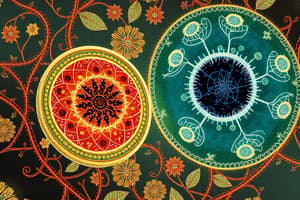Podcast
Questions and Answers
What are the two main types of cells?
What are the two main types of cells?
Prokaryotic and Eukaryotic
Who discovered cells and what did he examine?
Who discovered cells and what did he examine?
Robert Hooke examined a piece of cork.
All cells have a nucleus.
All cells have a nucleus.
False (B)
What is the primary structural component that separates a cell's interior from its environment?
What is the primary structural component that separates a cell's interior from its environment?
Match the following scientists to their contributions to cell theory:
Match the following scientists to their contributions to cell theory:
What are the four common components shared by all cells?
What are the four common components shared by all cells?
Which type of cell lacks membrane-bound organelles?
Which type of cell lacks membrane-bound organelles?
A ______ cell has a clearly defined nucleus.
A ______ cell has a clearly defined nucleus.
Name one example for each type of cell: Prokaryotic and Eukaryotic.
Name one example for each type of cell: Prokaryotic and Eukaryotic.
Flashcards are hidden until you start studying
Study Notes
Cell Discovery
- Robert Hooke, in 1665, used a compound microscope to observe a thin slice of cork, discovering tiny compartments he named "cells".
- Antonie van Leeuwenhoek, using a single-lens microscope, observed bacteria and protozoa, magnifying objects up to 200-300 times their size.
Cell Theory
- Theodor Schwann (1839) proposed that all living organisms are composed of cells.
- Schwann and Matthias Schleiden (1839) further suggested that cells are the basic, fundamental building blocks of all living organisms.
- Rudolf Virchow (1858) added to the theory, stating that cells arise only from pre-existing cells.
Cell Overview
- Cells are categorized into two main types: prokaryotic and eukaryotic.
- Prokaryotes: Bacteria and Archaea, lack a nucleus and membrane-bound organelles.
- Eukaryotes: Animals, plants, fungi, and protists, have a nucleus and membrane-bound organelles.
- All cells share common features: plasma membrane, cytoplasm, DNA, and ribosomes.
Prokaryotic Cells
- Lack a true nucleus and membrane-bound organelles.
- Have a cell membrane, free-floating DNA, and ribosomes.
Eukaryotic Cells
- Have a well-defined nucleus enclosed by a nuclear membrane, containing chromosomes.
- Possess various organelles, including mitochondria, Golgi apparatus, endoplasmic reticulum, and lysosomes.
- Are generally larger and more complex than prokaryotic cells.
Differences between Prokaryotic and Eukaryotic Cells
- Nucleus: Absent in prokaryotes, present in eukaryotes.
- Nuclear Membrane: Absent in prokaryotes, present in eukaryotes.
- DNA Organization: Single circular DNA in prokaryotes, multiple linear chromosomes in eukaryotes.
- Organelles: Few or none in prokaryotes, many in eukaryotes, including mitochondria, Golgi apparatus, etc.
- Ribosomes: Smaller in prokaryotes, larger in eukaryotes.
- Cell Size: Generally smaller (1-10 μm) in prokaryotes, generally larger (10-100 μm) in eukaryotes.
- Examples: Bacteria and Archaea are prokaryotic; Plants, Animals, Fungi, and Protists are eukaryotic.
Cell Structure and Function
- The structure of a cell is directly related to its function.
Studying That Suits You
Use AI to generate personalized quizzes and flashcards to suit your learning preferences.



